Unit 2 Festivals and holidays 知识清单(含书面表达和练习题)【冀教2024版八上英语】
文档属性
| 名称 | Unit 2 Festivals and holidays 知识清单(含书面表达和练习题)【冀教2024版八上英语】 | 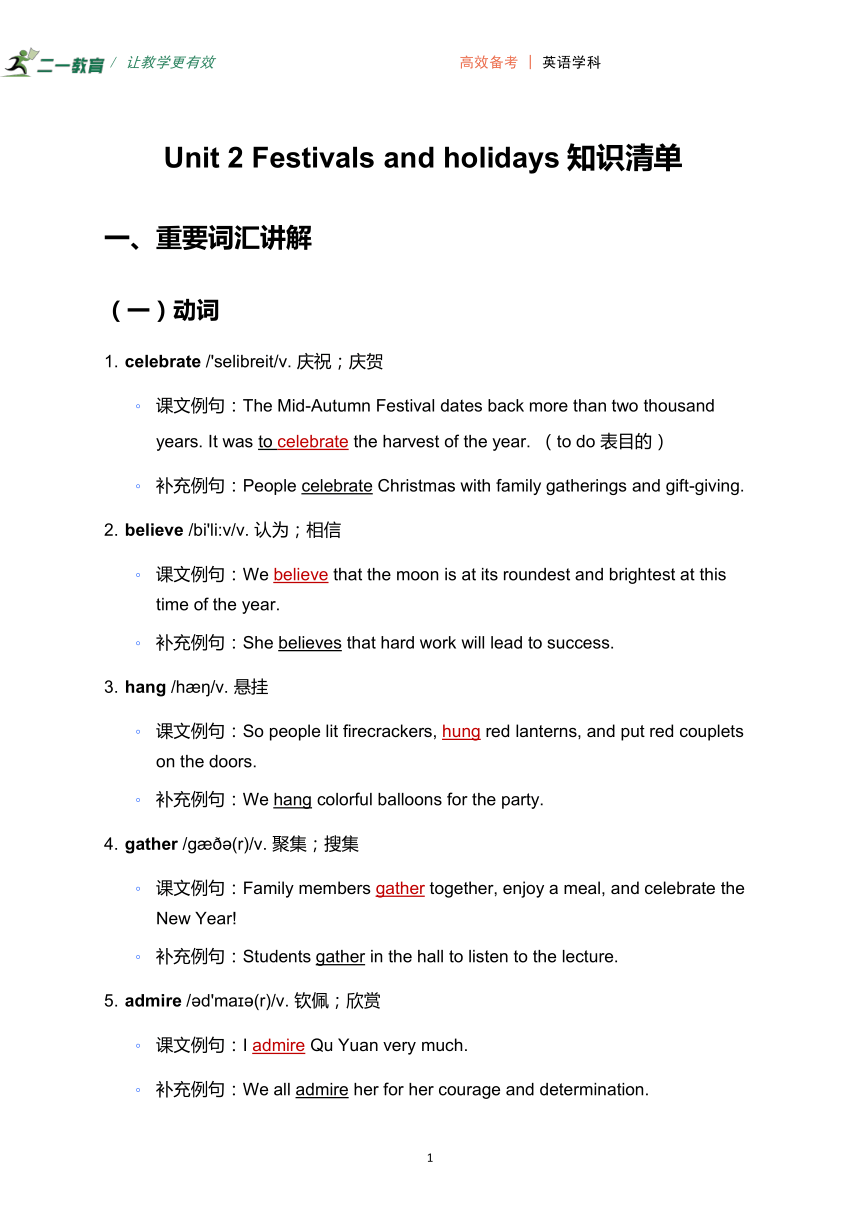 | |
| 格式 | docx | ||
| 文件大小 | 44.4KB | ||
| 资源类型 | 试卷 | ||
| 版本资源 | 冀教版 | ||
| 科目 | 英语 | ||
| 更新时间 | 2025-07-04 16:59:08 | ||
图片预览

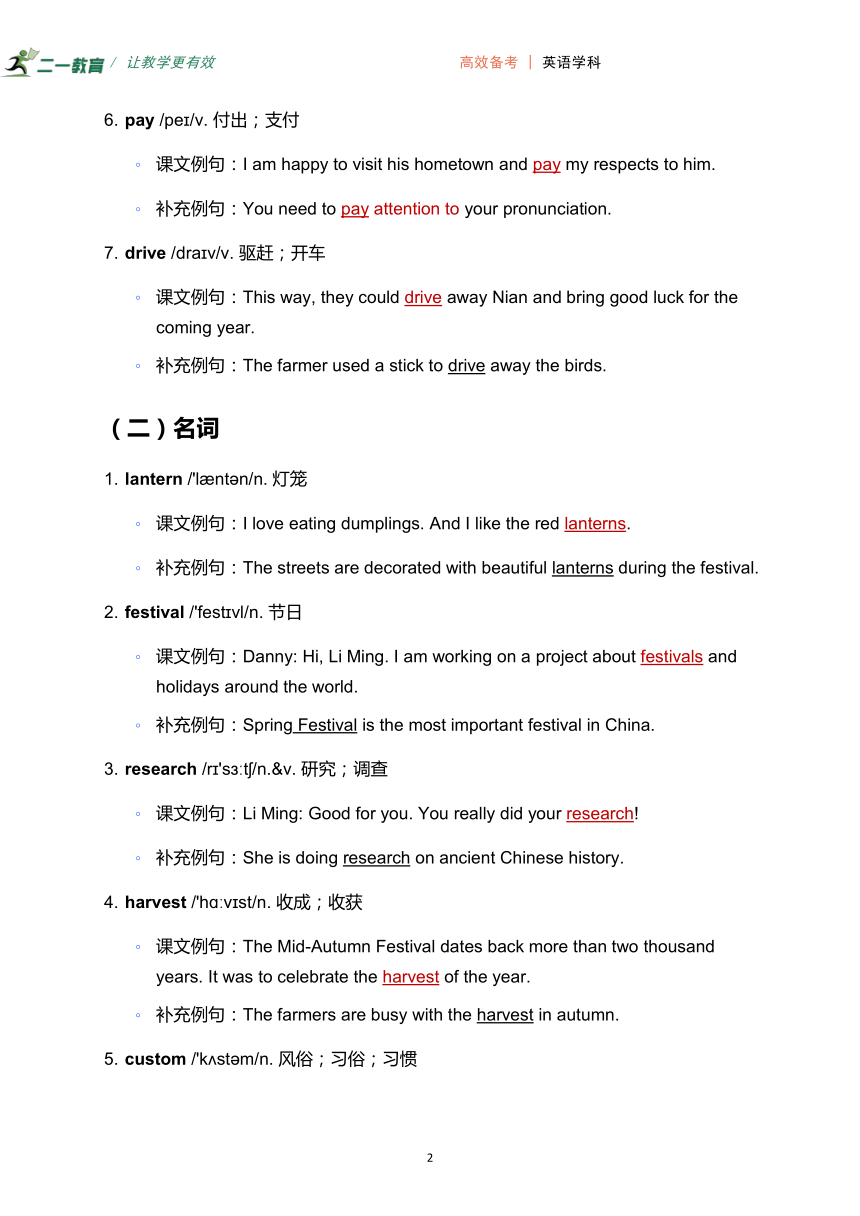
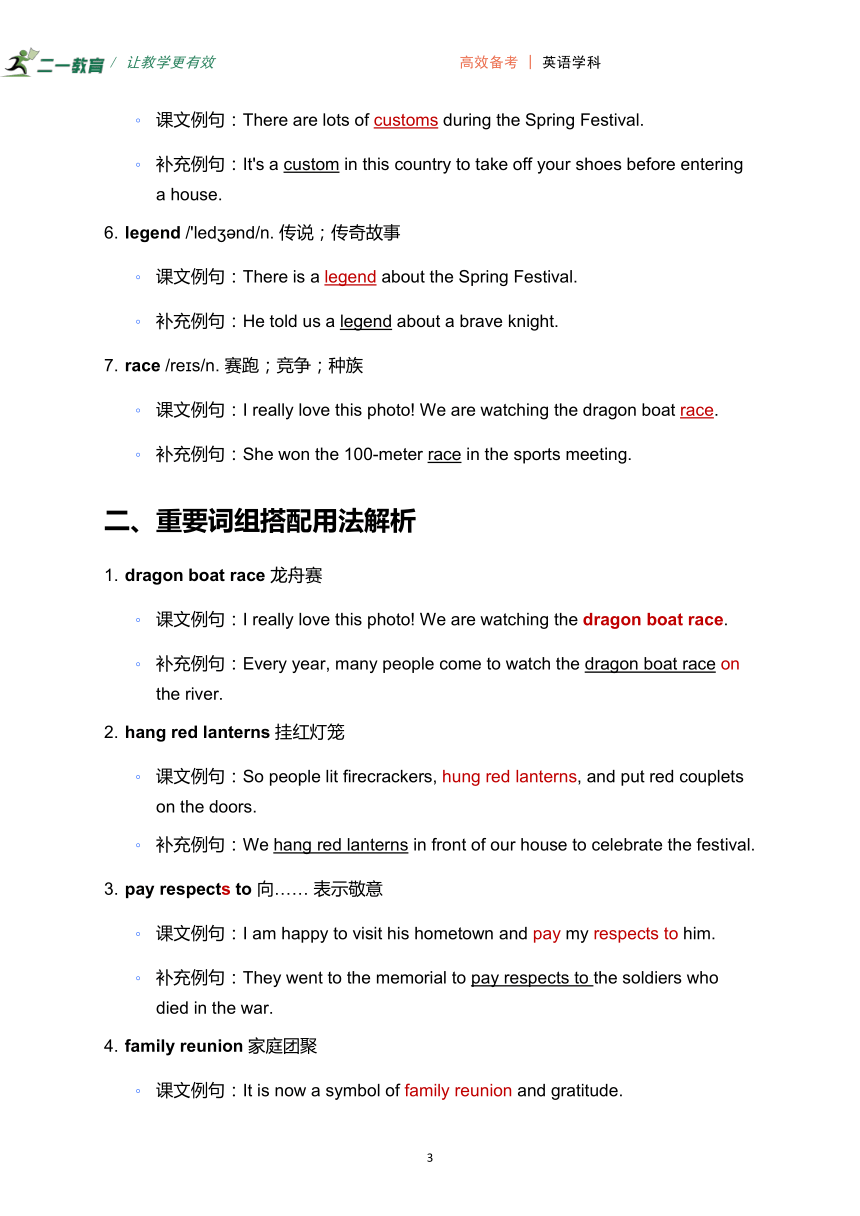
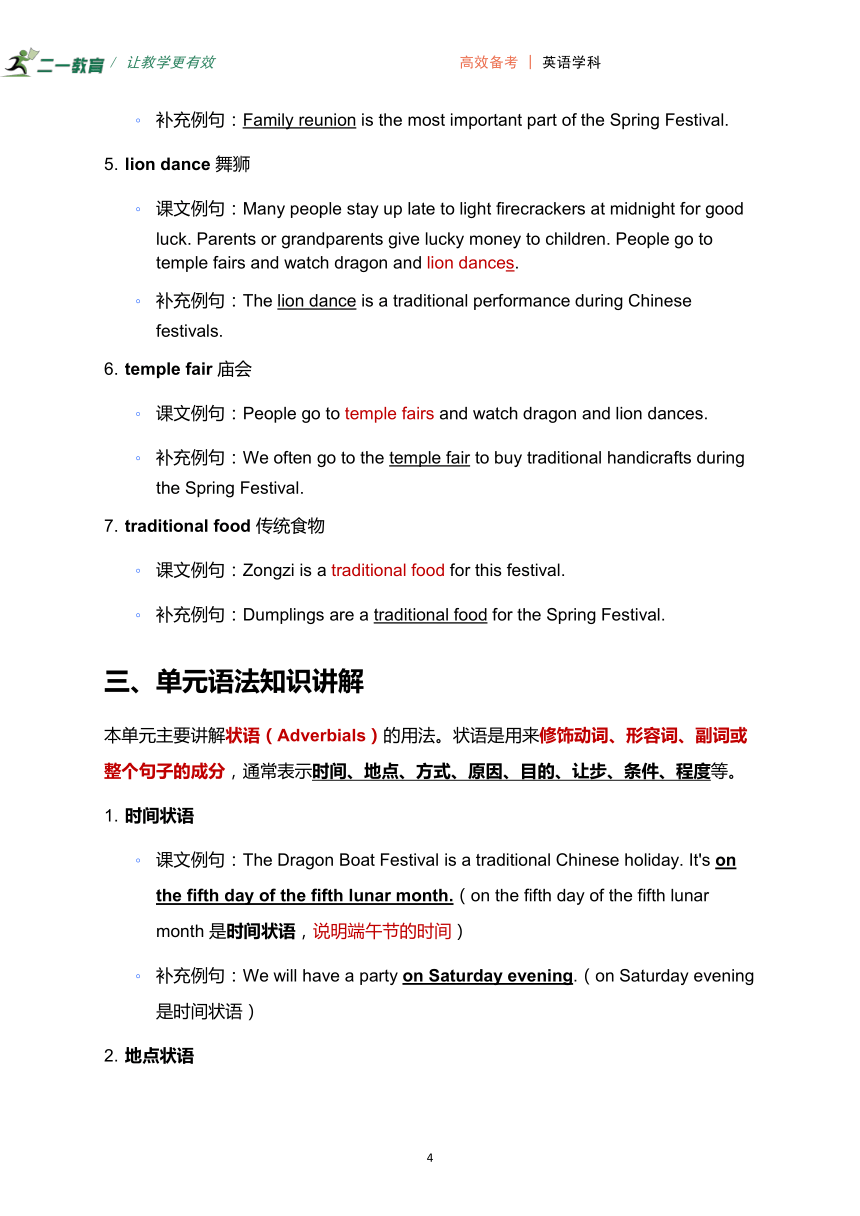
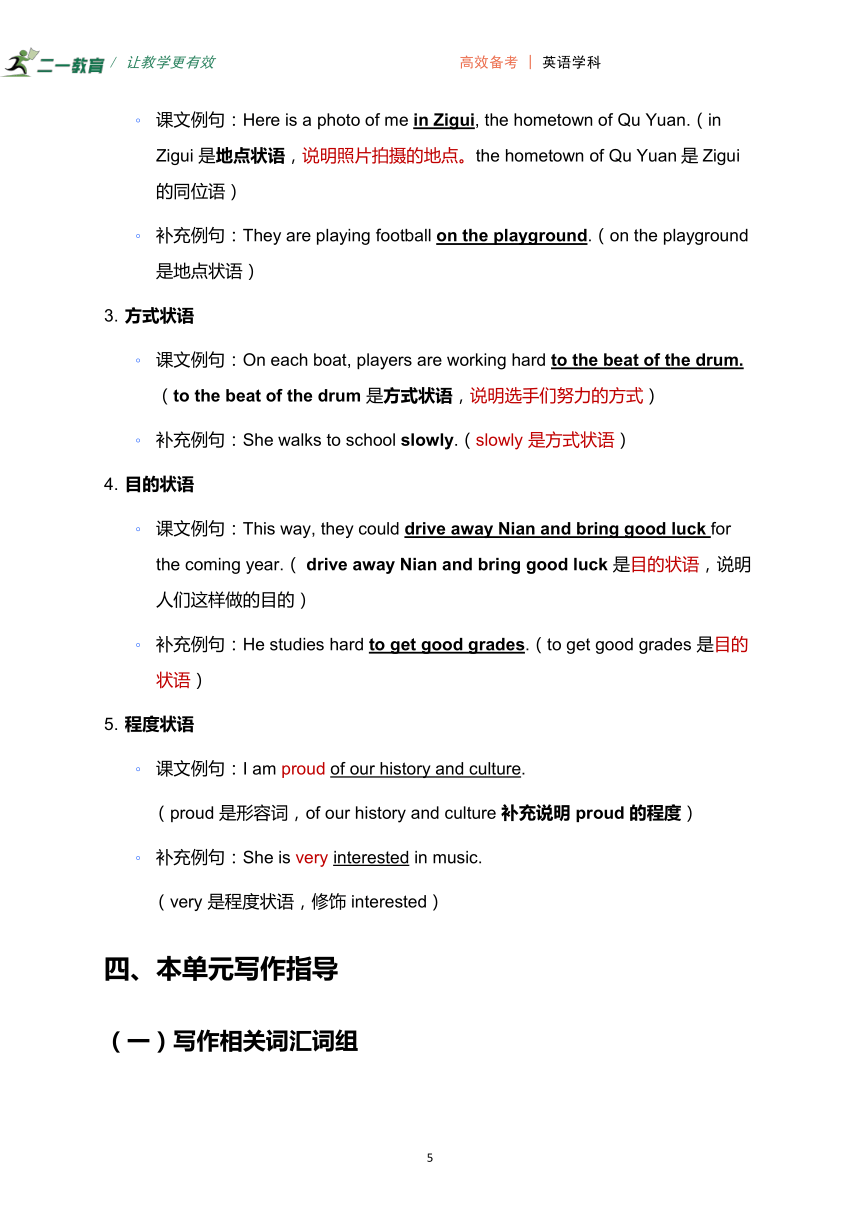
文档简介
/ 让教学更有效 高效备考 | 英语学科
Unit 2 Festivals and holidays知识清单
一、重要词汇讲解
(一)动词
celebrate /'selibreit/v. 庆祝;庆贺
课文例句:The Mid-Autumn Festival dates back more than two thousand years. It was to celebrate the harvest of the year.
(to do 表目的)
补充例句:People celebrate Christmas with family gatherings and gift-giving.
believe /bi'li:v/v. 认为;相信
课文例句:We believe that the moon is at its roundest and brightest at this time of the year.
补充例句:She believes that hard work will lead to success.
hang /h /v. 悬挂
课文例句:So people lit firecrackers, hung red lanterns, and put red couplets on the doors.
补充例句:We hang colorful balloons for the party.
gather /g (r)/v. 聚集;搜集
课文例句:Family members gather together, enjoy a meal, and celebrate the New Year!
补充例句:Students gather in the hall to listen to the lecture.
admire / d'ma (r)/v. 钦佩;欣赏
课文例句:I admire Qu Yuan very much.
补充例句:We all admire her for her courage and determination.
pay /pe /v. 付出;支付
课文例句:I am happy to visit his hometown and pay my respects to him.
补充例句:You need to pay attention to your pronunciation.
drive /dra v/v. 驱赶;开车
课文例句:This way, they could drive away Nian and bring good luck for the coming year.
补充例句:The farmer used a stick to drive away the birds.
(二)名词
lantern /'l nt n/n. 灯笼
课文例句:I love eating dumplings. And I like the red lanterns.
补充例句:The streets are decorated with beautiful lanterns during the festival.
festival /'fest vl/n. 节日
课文例句:Danny: Hi, Li Ming. I am working on a project about festivals and holidays around the world.
补充例句:Spring Festival is the most important festival in China.
research /r 's t /n.&v. 研究;调查
课文例句:Li Ming: Good for you. You really did your research!
补充例句:She is doing research on ancient Chinese history.
harvest /'hɑ v st/n. 收成;收获
课文例句:The Mid-Autumn Festival dates back more than two thousand years. It was to celebrate the harvest of the year.
补充例句:The farmers are busy with the harvest in autumn.
custom /'k st m/n. 风俗;习俗;习惯
课文例句:There are lots of customs during the Spring Festival.
补充例句:It's a custom in this country to take off your shoes before entering a house.
legend /'led nd/n. 传说;传奇故事
课文例句:There is a legend about the Spring Festival.
补充例句:He told us a legend about a brave knight.
race /re s/n. 赛跑;竞争;种族
课文例句:I really love this photo! We are watching the dragon boat race.
补充例句:She won the 100-meter race in the sports meeting.
二、重要词组搭配用法解析
dragon boat race 龙舟赛
课文例句:I really love this photo! We are watching the dragon boat race.
补充例句:Every year, many people come to watch the dragon boat race on the river.
hang red lanterns 挂红灯笼
课文例句:So people lit firecrackers, hung red lanterns, and put red couplets on the doors.
补充例句:We hang red lanterns in front of our house to celebrate the festival.
pay respects to 向…… 表示敬意
课文例句:I am happy to visit his hometown and pay my respects to him.
补充例句:They went to the memorial to pay respects to the soldiers who died in the war.
family reunion 家庭团聚
课文例句:It is now a symbol of family reunion and gratitude.
补充例句:Family reunion is the most important part of the Spring Festival.
lion dance 舞狮
课文例句:Many people stay up late to light firecrackers at midnight for good luck. Parents or grandparents give lucky money to children. People go to temple fairs and watch dragon and lion dances.
补充例句:The lion dance is a traditional performance during Chinese festivals.
temple fair 庙会
课文例句:People go to temple fairs and watch dragon and lion dances.
补充例句:We often go to the temple fair to buy traditional handicrafts during the Spring Festival.
traditional food 传统食物
课文例句:Zongzi is a traditional food for this festival.
补充例句:Dumplings are a traditional food for the Spring Festival.
三、单元语法知识讲解
本单元主要讲解状语(Adverbials)的用法。状语是用来修饰动词、形容词、副词或整个句子的成分,通常表示时间、地点、方式、原因、目的、让步、条件、程度等。
时间状语
课文例句:The Dragon Boat Festival is a traditional Chinese holiday. It's on the fifth day of the fifth lunar month.(on the fifth day of the fifth lunar month 是时间状语,说明端午节的时间)
补充例句:We will have a party on Saturday evening.(on Saturday evening 是时间状语)
地点状语
课文例句:Here is a photo of me in Zigui, the hometown of Qu Yuan.(in Zigui 是地点状语,说明照片拍摄的地点。the hometown of Qu Yuan是Zigui的同位语)
补充例句:They are playing football on the playground.(on the playground 是地点状语)
方式状语
课文例句:On each boat, players are working hard to the beat of the drum.(to the beat of the drum 是方式状语,说明选手们努力的方式)
补充例句:She walks to school slowly.(slowly 是方式状语)
目的状语
课文例句:This way, they could drive away Nian and bring good luck for the coming year.( drive away Nian and bring good luck 是目的状语,说明人们这样做的目的)
补充例句:He studies hard to get good grades.(to get good grades 是目的状语)
程度状语
课文例句:I am proud of our history and culture.
(proud 是形容词,of our history and culture 补充说明 proud 的程度)
补充例句:She is very interested in music.
(very 是程度状语,修饰 interested)
四、本单元写作指导
(一)写作相关词汇词组
节日名称:Spring Festival(春节)、Mid-Autumn Festival(中秋节)、Dragon Boat Festival(端午节)、Double Ninth Festival(重阳节)、National Day(国庆节)、Labour Day(劳动节)
节日活动:hang red lanterns(挂红灯笼)、eat dumplings(吃饺子)、watch dragon boat races(看龙舟赛)、enjoy the full moon(赏月)、get together(团聚)、visit relatives(拜访亲戚)、light firecrackers(放鞭炮)、give lucky money(发压岁钱)
节日食物:dumplings(饺子)、mooncakes(月饼)、zongzi(粽子)、Chongyang cakes(重阳糕)
情感表达:be proud of(为…… 自豪)、be interested in(对…… 感兴趣)、feel happy(感到高兴)、show gratitude(表达感激)
(二)高分句式句型
The [Festival Name] falls on [date]. ([节日名称] 在 [日期]。)
例句:The Spring Festival falls on the first day of the first lunar month.
It is a time for [activity]. (这是一个 [活动] 的时刻。)
例句:The Mid-Autumn Festival is a time for family reunion.
People celebrate [Festival Name] by [activity]. (人们通过 [活动] 庆祝 [节日名称]。)
例句:People celebrate the Dragon Boat Festival by eating zongzi and watching dragon boat races.
During [Festival Name], people usually [activity]. (在 [节日名称] 期间,人们通常 [活动]。)
例句:During the Spring Festival, people usually visit their relatives and friends.
It is a traditional festival that symbolizes [meaning]. (这是一个象征着 [意义] 的传统节日。)
例句:The Mid-Autumn Festival is a traditional festival that symbolizes family reunion.
(三)参考范文
My Favorite Festival
My favorite festival is the Spring Festival, which is also called Chinese New Year. It falls on the first day of the first lunar month and is the most important traditional festival in China.
(交代节日和意义)
Before the festival, people are busy cleaning their homes and buying new clothes. On New Year's Eve, family members gather together for a big reunion dinner. We eat delicious food like dumplings, which symbolize wealth. After dinner, we watch the Spring Festival Gala on TV and chat with each other. At midnight, we light firecrackers to welcome the new year and drive away evil spirits.
(交代节日前的准备)
During the festival, children are very happy because they can get lucky money from their elders. We also visit our relatives and friends to exchange greetings and good wishes. Everyone wears new clothes and has a smile on their face.
(节日时的活动和感受)
I love the Spring Festival because it is a time for family reunion and happiness. It makes me feel the warmth of family and the joy of celebrating traditions.
(总结升华)
(四)写作模板
介绍一个传统节日的写作模板
开头:引出节日名称及重要性
My favorite traditional Chinese festival is [Festival Name]. It is one of the most important festivals in China.
中间:介绍节日时间、活动、食物等
The festival falls on [date].(日期)
Before the festival, people usually [pre-festival activities, e.g., clean their homes, buy special food].
(节前准备和活动)
On the day of the festival, families [main activities, e.g., get together for a big dinner, visit relatives].
(节日当天的活动)
People also enjoy eating [traditional food, e.g., mooncakes, zongzi] during the festival.
(节日习俗)
结尾:表达对节日的感受或意义
I like [Festival Name] because [reason, e.g., it brings family together, I enjoy the special activities].
(喜欢节日的原因)
It is a festival that [meaning, e.g., symbolizes love and reunion, keeps our traditions alive].
(节日的意义)
五、相关练习题
(一)词汇练习题
根据句意及首字母提示写出单词。
We c______ the Spring Festival with family and friends.
People b______ that the moon is roundest on the Mid-Autumn Festival.
They h______ red lanterns in front of the house.
The farmers are busy with the h______ in autumn.
It's a c______ in our family to have a big dinner on New Year's Eve.
用所给单词的适当形式填空。
People enjoy ______ (watch) dragon boat races during the Dragon Boat Festival.
She is ______ (pride) of her country's culture.
We ______ (gather) together to celebrate the festival last night.
He ______ (admire) Qu Yuan for his love for his country.
The children are looking forward to ______ (get) lucky money.
(二)词组练习题
从方框中选择合适的词组填空,使句子完整通顺。
dragon boat race, family reunion, hang red lanterns, pay respects to, traditional food
We will have a ______ on the Mid-Autumn Festival.
People usually ______ during the Spring Festival.
Zongzi is a ______ for the Dragon Boat Festival.
Many people come to watch the ______ on the river.
They go to the temple to ______ their ancestors.
(三)语法练习题
指出下列句子中的状语,并说明其类型。
We will visit our grandparents on Sunday.
They are playing games in the park.
She studies hard to pass the exam.
He ran very fast.
In winter, it is cold in the north.
(四)写作练习题
根据本单元写作模板,介绍一个你最喜欢的中国传统节日,要求包含节日的时间、活动、食物以及你喜欢它的原因。
练习题答案解析
词汇练习题
根据句意及首字母提示写出单词
celebrate:句子表达 “我们和家人朋友一起庆祝春节”,结合首字母 “c” 和 “庆祝” 含义,应填 “celebrate”。
believe:“人们认为中秋节的月亮最圆最亮”,“认为;相信” 对应 “believe”,符合语境和首字母要求。
hang:“他们在房子前面挂红灯笼”,“悬挂” 用 “hang”,与首字母一致。
harvest:“农民们在秋天忙着收获”,“收成;收获” 是 “harvest” ,符合句子逻辑和首字母提示。
custom:“在我们家,除夕夜吃一顿丰盛的晚餐是一个习俗”,“风俗;习俗” 为 “custom”,满足句意和首字母条件。
用所给单词的适当形式填空
watching:“enjoy doing sth.” 是固定用法,表示 “喜欢做某事”,所以 “watch” 要用动名词形式 “watching”,即 “人们在端午节喜欢看龙舟比赛”。
proud:“be proud of” 为固定短语,意为 “为…… 自豪”,所以这里用形容词 “proud”,“她为自己国家的文化感到自豪”。
gathered:由 “last night” 可知句子时态为一般过去时,“gather” 的过去式是 “gathered”,“昨晚我们聚在一起庆祝节日”。
admires:句子陈述一般事实,主语 “He” 是第三人称单数,所以 “admire” 要用第三人称单数形式 “admires”,“他因屈原对国家的热爱而钦佩他”。
getting:“look forward to doing sth.” 表示 “期待做某事”,“to” 是介词,后接动名词,所以 “get” 要变为 “getting”,“孩子们期待着得到压岁钱”。
词组练习题
从方框中选择合适的词组填空,使句子完整通顺
family reunion:“我们将在中秋节团聚”,“family reunion” 表示 “家庭团聚”,符合中秋节的情境。
hang red lanterns:“人们通常在春节挂红灯笼”,“hang red lanterns” 是春节常见活动,与句子语境相符。
traditional food:“粽子是端午节的传统食物”,“traditional food” 即 “传统食物”,符合对粽子的描述。 dragon boat race:“许多人来河边观看龙舟比赛”,“dragon boat race” 为 “龙舟赛”,和 “on the river” 对应。
pay respects to:“他们去寺庙向祖先致敬”,“pay respects to” 表示 “向…… 表示敬意” ,符合去寺庙的目的。
语法练习题
指出下列句子中的状语,并说明其类型
on Sunday,时间状语:“We will visit our grandparents on Sunday.” 中,“on Sunday” 表明拜访祖父母的时间,修饰整个句子,属于时间状语。
in the park,地点状语:“They are playing games in the park.” 里,“in the park” 指出玩游戏的地点,修饰 “are playing games”,是地点状语。
to pass the exam,目的状语:“She studies hard to pass the exam.” 中,“to pass the exam” 说明努力学习的目的,修饰 “studies hard”,为目的状语。
very fast,程度状语:“He ran very fast.” 中,“very fast” 描述 “ran” 的程度,对动词 “ran” 进行修饰,属于程度状语。
In winter,时间状语;in the north,地点状语:“In winter, it is cold in the north.” ,“In winter” 表示时间,修饰整个句子;“in the north” 表示地点,修饰 “is cold” ,分别是时间状语和地点状语。
(四)写作参考范文
My Favorite Festival - The Mid - Autumn Festival
My favorite traditional Chinese festival is the Mid - Autumn Festival. It is one of the most significant festivals in China, carrying rich cultural connotations and deep - seated emotions. The festival falls on the 15th day of the 8th lunar month when the moon is at its fullest and brightest. (介绍节日及时间)
Before the festival, people are busy shopping for mooncakes, which come in various flavors like lotus seed paste with egg yolk and five - kernel. They also clean their houses thoroughly, making everything tidy and ready for the celebration. (节日前的准备)
On the day of the festival, families get together for a big dinner. Dishes filled with the warmth of home are served on the table. After dinner, everyone goes outside to enjoy the full moon. We sit in the yard, chatting, sharing stories, and eating mooncakes. Some families also play games under the moonlight, creating a harmonious and joyful atmosphere. (节日当天的活动)
It is a time for family reunion, a moment when the distance between family members is shortened, and love is fully expressed. I like the Mid - Autumn Festival because it makes me feel the strong bond of family. No matter how far apart we are usually, we will try our best to get together on this special day. It is a festival that symbolizes unity and love, reminding us of the importance of family and the beauty of traditional culture.(节日的意义及个人感受)
Unit 2 Festivals and holidays知识清单
一、重要词汇讲解
(一)动词
celebrate /'selibreit/v. 庆祝;庆贺
课文例句:The Mid-Autumn Festival dates back more than two thousand years. It was to celebrate the harvest of the year.
(to do 表目的)
补充例句:People celebrate Christmas with family gatherings and gift-giving.
believe /bi'li:v/v. 认为;相信
课文例句:We believe that the moon is at its roundest and brightest at this time of the year.
补充例句:She believes that hard work will lead to success.
hang /h /v. 悬挂
课文例句:So people lit firecrackers, hung red lanterns, and put red couplets on the doors.
补充例句:We hang colorful balloons for the party.
gather /g (r)/v. 聚集;搜集
课文例句:Family members gather together, enjoy a meal, and celebrate the New Year!
补充例句:Students gather in the hall to listen to the lecture.
admire / d'ma (r)/v. 钦佩;欣赏
课文例句:I admire Qu Yuan very much.
补充例句:We all admire her for her courage and determination.
pay /pe /v. 付出;支付
课文例句:I am happy to visit his hometown and pay my respects to him.
补充例句:You need to pay attention to your pronunciation.
drive /dra v/v. 驱赶;开车
课文例句:This way, they could drive away Nian and bring good luck for the coming year.
补充例句:The farmer used a stick to drive away the birds.
(二)名词
lantern /'l nt n/n. 灯笼
课文例句:I love eating dumplings. And I like the red lanterns.
补充例句:The streets are decorated with beautiful lanterns during the festival.
festival /'fest vl/n. 节日
课文例句:Danny: Hi, Li Ming. I am working on a project about festivals and holidays around the world.
补充例句:Spring Festival is the most important festival in China.
research /r 's t /n.&v. 研究;调查
课文例句:Li Ming: Good for you. You really did your research!
补充例句:She is doing research on ancient Chinese history.
harvest /'hɑ v st/n. 收成;收获
课文例句:The Mid-Autumn Festival dates back more than two thousand years. It was to celebrate the harvest of the year.
补充例句:The farmers are busy with the harvest in autumn.
custom /'k st m/n. 风俗;习俗;习惯
课文例句:There are lots of customs during the Spring Festival.
补充例句:It's a custom in this country to take off your shoes before entering a house.
legend /'led nd/n. 传说;传奇故事
课文例句:There is a legend about the Spring Festival.
补充例句:He told us a legend about a brave knight.
race /re s/n. 赛跑;竞争;种族
课文例句:I really love this photo! We are watching the dragon boat race.
补充例句:She won the 100-meter race in the sports meeting.
二、重要词组搭配用法解析
dragon boat race 龙舟赛
课文例句:I really love this photo! We are watching the dragon boat race.
补充例句:Every year, many people come to watch the dragon boat race on the river.
hang red lanterns 挂红灯笼
课文例句:So people lit firecrackers, hung red lanterns, and put red couplets on the doors.
补充例句:We hang red lanterns in front of our house to celebrate the festival.
pay respects to 向…… 表示敬意
课文例句:I am happy to visit his hometown and pay my respects to him.
补充例句:They went to the memorial to pay respects to the soldiers who died in the war.
family reunion 家庭团聚
课文例句:It is now a symbol of family reunion and gratitude.
补充例句:Family reunion is the most important part of the Spring Festival.
lion dance 舞狮
课文例句:Many people stay up late to light firecrackers at midnight for good luck. Parents or grandparents give lucky money to children. People go to temple fairs and watch dragon and lion dances.
补充例句:The lion dance is a traditional performance during Chinese festivals.
temple fair 庙会
课文例句:People go to temple fairs and watch dragon and lion dances.
补充例句:We often go to the temple fair to buy traditional handicrafts during the Spring Festival.
traditional food 传统食物
课文例句:Zongzi is a traditional food for this festival.
补充例句:Dumplings are a traditional food for the Spring Festival.
三、单元语法知识讲解
本单元主要讲解状语(Adverbials)的用法。状语是用来修饰动词、形容词、副词或整个句子的成分,通常表示时间、地点、方式、原因、目的、让步、条件、程度等。
时间状语
课文例句:The Dragon Boat Festival is a traditional Chinese holiday. It's on the fifth day of the fifth lunar month.(on the fifth day of the fifth lunar month 是时间状语,说明端午节的时间)
补充例句:We will have a party on Saturday evening.(on Saturday evening 是时间状语)
地点状语
课文例句:Here is a photo of me in Zigui, the hometown of Qu Yuan.(in Zigui 是地点状语,说明照片拍摄的地点。the hometown of Qu Yuan是Zigui的同位语)
补充例句:They are playing football on the playground.(on the playground 是地点状语)
方式状语
课文例句:On each boat, players are working hard to the beat of the drum.(to the beat of the drum 是方式状语,说明选手们努力的方式)
补充例句:She walks to school slowly.(slowly 是方式状语)
目的状语
课文例句:This way, they could drive away Nian and bring good luck for the coming year.( drive away Nian and bring good luck 是目的状语,说明人们这样做的目的)
补充例句:He studies hard to get good grades.(to get good grades 是目的状语)
程度状语
课文例句:I am proud of our history and culture.
(proud 是形容词,of our history and culture 补充说明 proud 的程度)
补充例句:She is very interested in music.
(very 是程度状语,修饰 interested)
四、本单元写作指导
(一)写作相关词汇词组
节日名称:Spring Festival(春节)、Mid-Autumn Festival(中秋节)、Dragon Boat Festival(端午节)、Double Ninth Festival(重阳节)、National Day(国庆节)、Labour Day(劳动节)
节日活动:hang red lanterns(挂红灯笼)、eat dumplings(吃饺子)、watch dragon boat races(看龙舟赛)、enjoy the full moon(赏月)、get together(团聚)、visit relatives(拜访亲戚)、light firecrackers(放鞭炮)、give lucky money(发压岁钱)
节日食物:dumplings(饺子)、mooncakes(月饼)、zongzi(粽子)、Chongyang cakes(重阳糕)
情感表达:be proud of(为…… 自豪)、be interested in(对…… 感兴趣)、feel happy(感到高兴)、show gratitude(表达感激)
(二)高分句式句型
The [Festival Name] falls on [date]. ([节日名称] 在 [日期]。)
例句:The Spring Festival falls on the first day of the first lunar month.
It is a time for [activity]. (这是一个 [活动] 的时刻。)
例句:The Mid-Autumn Festival is a time for family reunion.
People celebrate [Festival Name] by [activity]. (人们通过 [活动] 庆祝 [节日名称]。)
例句:People celebrate the Dragon Boat Festival by eating zongzi and watching dragon boat races.
During [Festival Name], people usually [activity]. (在 [节日名称] 期间,人们通常 [活动]。)
例句:During the Spring Festival, people usually visit their relatives and friends.
It is a traditional festival that symbolizes [meaning]. (这是一个象征着 [意义] 的传统节日。)
例句:The Mid-Autumn Festival is a traditional festival that symbolizes family reunion.
(三)参考范文
My Favorite Festival
My favorite festival is the Spring Festival, which is also called Chinese New Year. It falls on the first day of the first lunar month and is the most important traditional festival in China.
(交代节日和意义)
Before the festival, people are busy cleaning their homes and buying new clothes. On New Year's Eve, family members gather together for a big reunion dinner. We eat delicious food like dumplings, which symbolize wealth. After dinner, we watch the Spring Festival Gala on TV and chat with each other. At midnight, we light firecrackers to welcome the new year and drive away evil spirits.
(交代节日前的准备)
During the festival, children are very happy because they can get lucky money from their elders. We also visit our relatives and friends to exchange greetings and good wishes. Everyone wears new clothes and has a smile on their face.
(节日时的活动和感受)
I love the Spring Festival because it is a time for family reunion and happiness. It makes me feel the warmth of family and the joy of celebrating traditions.
(总结升华)
(四)写作模板
介绍一个传统节日的写作模板
开头:引出节日名称及重要性
My favorite traditional Chinese festival is [Festival Name]. It is one of the most important festivals in China.
中间:介绍节日时间、活动、食物等
The festival falls on [date].(日期)
Before the festival, people usually [pre-festival activities, e.g., clean their homes, buy special food].
(节前准备和活动)
On the day of the festival, families [main activities, e.g., get together for a big dinner, visit relatives].
(节日当天的活动)
People also enjoy eating [traditional food, e.g., mooncakes, zongzi] during the festival.
(节日习俗)
结尾:表达对节日的感受或意义
I like [Festival Name] because [reason, e.g., it brings family together, I enjoy the special activities].
(喜欢节日的原因)
It is a festival that [meaning, e.g., symbolizes love and reunion, keeps our traditions alive].
(节日的意义)
五、相关练习题
(一)词汇练习题
根据句意及首字母提示写出单词。
We c______ the Spring Festival with family and friends.
People b______ that the moon is roundest on the Mid-Autumn Festival.
They h______ red lanterns in front of the house.
The farmers are busy with the h______ in autumn.
It's a c______ in our family to have a big dinner on New Year's Eve.
用所给单词的适当形式填空。
People enjoy ______ (watch) dragon boat races during the Dragon Boat Festival.
She is ______ (pride) of her country's culture.
We ______ (gather) together to celebrate the festival last night.
He ______ (admire) Qu Yuan for his love for his country.
The children are looking forward to ______ (get) lucky money.
(二)词组练习题
从方框中选择合适的词组填空,使句子完整通顺。
dragon boat race, family reunion, hang red lanterns, pay respects to, traditional food
We will have a ______ on the Mid-Autumn Festival.
People usually ______ during the Spring Festival.
Zongzi is a ______ for the Dragon Boat Festival.
Many people come to watch the ______ on the river.
They go to the temple to ______ their ancestors.
(三)语法练习题
指出下列句子中的状语,并说明其类型。
We will visit our grandparents on Sunday.
They are playing games in the park.
She studies hard to pass the exam.
He ran very fast.
In winter, it is cold in the north.
(四)写作练习题
根据本单元写作模板,介绍一个你最喜欢的中国传统节日,要求包含节日的时间、活动、食物以及你喜欢它的原因。
练习题答案解析
词汇练习题
根据句意及首字母提示写出单词
celebrate:句子表达 “我们和家人朋友一起庆祝春节”,结合首字母 “c” 和 “庆祝” 含义,应填 “celebrate”。
believe:“人们认为中秋节的月亮最圆最亮”,“认为;相信” 对应 “believe”,符合语境和首字母要求。
hang:“他们在房子前面挂红灯笼”,“悬挂” 用 “hang”,与首字母一致。
harvest:“农民们在秋天忙着收获”,“收成;收获” 是 “harvest” ,符合句子逻辑和首字母提示。
custom:“在我们家,除夕夜吃一顿丰盛的晚餐是一个习俗”,“风俗;习俗” 为 “custom”,满足句意和首字母条件。
用所给单词的适当形式填空
watching:“enjoy doing sth.” 是固定用法,表示 “喜欢做某事”,所以 “watch” 要用动名词形式 “watching”,即 “人们在端午节喜欢看龙舟比赛”。
proud:“be proud of” 为固定短语,意为 “为…… 自豪”,所以这里用形容词 “proud”,“她为自己国家的文化感到自豪”。
gathered:由 “last night” 可知句子时态为一般过去时,“gather” 的过去式是 “gathered”,“昨晚我们聚在一起庆祝节日”。
admires:句子陈述一般事实,主语 “He” 是第三人称单数,所以 “admire” 要用第三人称单数形式 “admires”,“他因屈原对国家的热爱而钦佩他”。
getting:“look forward to doing sth.” 表示 “期待做某事”,“to” 是介词,后接动名词,所以 “get” 要变为 “getting”,“孩子们期待着得到压岁钱”。
词组练习题
从方框中选择合适的词组填空,使句子完整通顺
family reunion:“我们将在中秋节团聚”,“family reunion” 表示 “家庭团聚”,符合中秋节的情境。
hang red lanterns:“人们通常在春节挂红灯笼”,“hang red lanterns” 是春节常见活动,与句子语境相符。
traditional food:“粽子是端午节的传统食物”,“traditional food” 即 “传统食物”,符合对粽子的描述。 dragon boat race:“许多人来河边观看龙舟比赛”,“dragon boat race” 为 “龙舟赛”,和 “on the river” 对应。
pay respects to:“他们去寺庙向祖先致敬”,“pay respects to” 表示 “向…… 表示敬意” ,符合去寺庙的目的。
语法练习题
指出下列句子中的状语,并说明其类型
on Sunday,时间状语:“We will visit our grandparents on Sunday.” 中,“on Sunday” 表明拜访祖父母的时间,修饰整个句子,属于时间状语。
in the park,地点状语:“They are playing games in the park.” 里,“in the park” 指出玩游戏的地点,修饰 “are playing games”,是地点状语。
to pass the exam,目的状语:“She studies hard to pass the exam.” 中,“to pass the exam” 说明努力学习的目的,修饰 “studies hard”,为目的状语。
very fast,程度状语:“He ran very fast.” 中,“very fast” 描述 “ran” 的程度,对动词 “ran” 进行修饰,属于程度状语。
In winter,时间状语;in the north,地点状语:“In winter, it is cold in the north.” ,“In winter” 表示时间,修饰整个句子;“in the north” 表示地点,修饰 “is cold” ,分别是时间状语和地点状语。
(四)写作参考范文
My Favorite Festival - The Mid - Autumn Festival
My favorite traditional Chinese festival is the Mid - Autumn Festival. It is one of the most significant festivals in China, carrying rich cultural connotations and deep - seated emotions. The festival falls on the 15th day of the 8th lunar month when the moon is at its fullest and brightest. (介绍节日及时间)
Before the festival, people are busy shopping for mooncakes, which come in various flavors like lotus seed paste with egg yolk and five - kernel. They also clean their houses thoroughly, making everything tidy and ready for the celebration. (节日前的准备)
On the day of the festival, families get together for a big dinner. Dishes filled with the warmth of home are served on the table. After dinner, everyone goes outside to enjoy the full moon. We sit in the yard, chatting, sharing stories, and eating mooncakes. Some families also play games under the moonlight, creating a harmonious and joyful atmosphere. (节日当天的活动)
It is a time for family reunion, a moment when the distance between family members is shortened, and love is fully expressed. I like the Mid - Autumn Festival because it makes me feel the strong bond of family. No matter how far apart we are usually, we will try our best to get together on this special day. It is a festival that symbolizes unity and love, reminding us of the importance of family and the beauty of traditional culture.(节日的意义及个人感受)
同课章节目录
